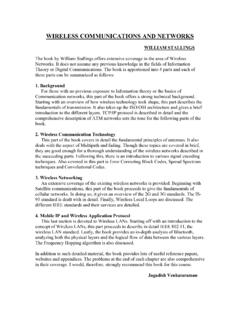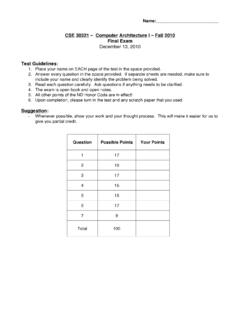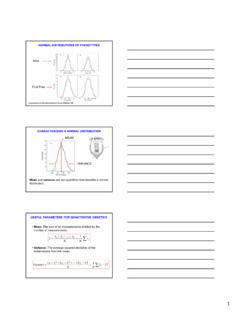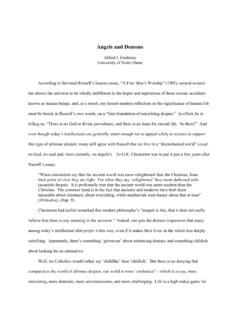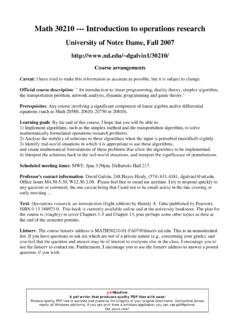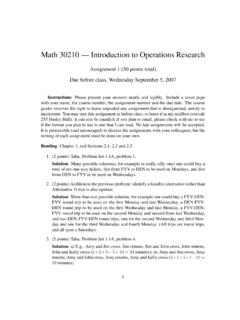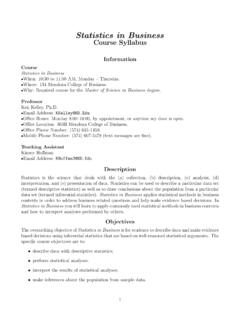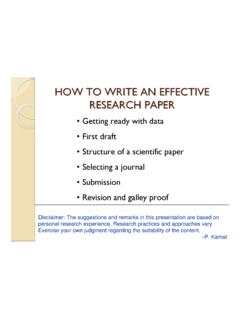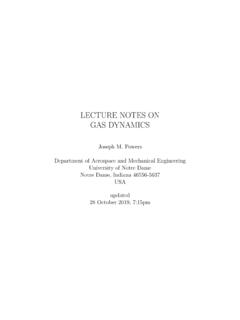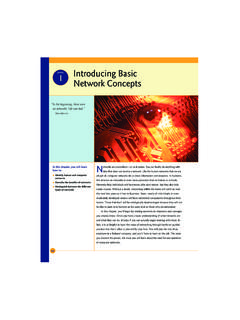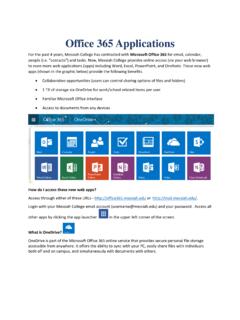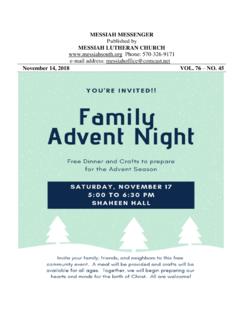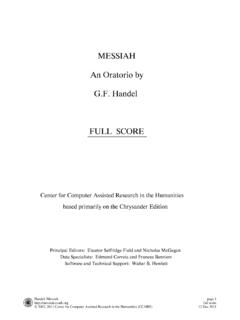Transcription of PRESENTS George Frideric Handel’s MESSIAH
1 UNIVERSITY OF NOTRE DAME DEPARTMENT OF MUSIC PRESENTS George Frideric Handel s MESSIAH University of Notre Dame Chorale & Festival Baroque Orchestra Alexander Blachly, Director Jessica Bush, Clarisse Wilson, Morgan Rice - soprano soloists Joshua Boggs countertenor soloist Wesley Dunnagan, Matthew Kelly - tenor soloists Greg Demet, Emorja Roberson, Edward Vogel - bass soloists 8:00 , Friday, December 4, 2015 8:00 , Saturday, December 5, 2015 Leighton Concert Hall Marie P. DeBartolo Center for the Performing Arts - 2 - Sinfony [Overture] Comfort ye (Isaiah 40: 1-3); Ev ry valley shall be exalted (Isaiah 40: 4) (tenor recitative and aria Wesley Dunnagan) And the glory of the Lord (Isaiah 51: 5) (chorus) Thus saith the Lord (Haggai 2: 6-7; Malachi 3: 1) (baritone recitative Greg Demet) But who may abide (Malachi 3: 2) (alto aria Joshua Boggs) And he shall purify (Malachi 3: 3) (chorus) Behold, a virgin shall conceive (Isaiah 7: 14; Matthew 1: 23); O thou that tellest good tidings (Isaiah 40: 9; 40: 1) (alto recitative and aria with chorus Joshua Boggs) For behold, darkness (Isaiah 40: 2-3); The people that walked in darkness (Isaiah 40: 2) (baritone recitative and aria Edward Vogel) For unto us a child is born (Isaiah 9: 6) (chorus) Pifa [Pastoral Symphony] (strings and continuo) There were shepherds (Luke 2: 8); And, lo, the angel (Luke 2: 9); And the angel said (Luke 2: 10-11).
2 And suddenly (Luke 2: 13) (soprano recitatives Jessica Bush) Glory to God (Luke 2: 14) (chorus) Rejoice greatly (Zechariah 9:9-10) (soprano aria Jessica Bush) He shall feed his flock (Isaiah 40: 11; Matthew 11: 28-29) (soprano aria Clarisse Wilson) His yoke is easy (Matthew 11: 30) (chorus) INTERMISSION Behold the Lamb of God (John 1: 29) (chorus) Surely He hath borne our griefs (Isaiah 53: 4-5) And With his Stripes (Isaiah 53: 5) All we like sheep (Isaiah 53: 6) (chorus) Thy rebuke hath broken his heart (Psalm 49: 21); Behold and see (Lamentations 1: 12); He was cut off (Isaiah 53: 8); But thou didst not leave (Psalm 16: 10) (tenor recitatives and arias Wesley Dunnagan) The Lord gave the word (Psalm 68: 11) (chorus) How beautiful are the feet (Romans 10: 15) (soprano aria Morgan Rice) Why do the nations (Psalm 2: 1-2) (baritone aria Emorja Roberson) I know that my redeemer liveth (Job 19: 25-26; Cor. 15: 20) (soprano aria Jessica Bush) Behold, I tell you a mystery (I Corinthians 15: 51-52); The trumpet shall sound (I Corinthians 15: 52-54) (bass recitative and aria Edward Vogel) Let us break their bonds asunder (Psalm 2: 8) (chorus) He that dwelleth in heaven (Psalm 2: 4); Thou shalt break them (Psalm 2: 9) (tenor aria Matthew Kelly) Hallelujah (Revelation 19: 6; 11: 15; 19: 16) (chorus) - 3 - Program Note Handel s MESSIAH has long enjoyed a unique and undisputed status as the most beloved sacred musical work in the English language.
3 Composed in a white heat of creative activity in the short space of just over three weeks (August 22 to September 14, 1741), it numbers among a group of works Handel wrote for presentation in Dublin, where the composer resided for an extended stay upon the invitation of the Lord Lieutenant of Ireland, William Cavendish, third Duke of Devonshire. In the event, Handel did not give the premiere of MESSIAH upon disembarking in November of 1741; he waited until April 13, 1742, five months later. First presented as a benefit for three Dublin charitable organizations, MESSIAH continued to be associated with a charity London s Foundling Hospital when it finally gained acceptance in England, beginning in 1750. Amazingly, the London public had mounted a spirited opposition to MESSIAH at its first performance in that city on March 23, 1743. The matter of greatest offense was the venue, the Theatre Royal in Covent Garden, a disreputable place peopled by actors and actresses of loose morals ( Robbins Landon).
4 The more Puritanical elements in English society also objected to having the words of Holy Scripture set to music in the theatrical, operatic manner. Today, on the other hand, MESSIAH wins only unqualified praise. Paul Henry Lang in 1977 called it as seemingly immune from criticism as the articles of faith. In London alone Handel conducted 36 performances of MESSIAH before his death in 1759, showing that it quickly became as popular in his day as it continues to be in ours. The texts for MESSIAH were compiled by Charles Jennens, who sent them to Handel in June 1741. As Robbins Landon has pointed out, much of the libretto comes from the Church of England s Book of Common Prayer. The resulting collection of Biblical passages PRESENTS not a story as such, but rather a collection of texts devoted to the history of Christianity, the whole arranged in a form that Lang terms an English anthem-oratorio.
5 Already in 1763, a Dr. John Brown observed that though called an Oratorio, yet [ MESSIAH ] is not dramatic but properly a Collection of Hymns or Anthems drawn from the sacred Scriptures. Yet while MESSIAH may not be a drama, strictly speaking, it does narrate the extraordinary story of Christianity from its first prophecies and the birth of Christ (Part I), to Christ s passion and resurrection (Part II), to the predictions of a future day of reckoning (Part III) in powerful choruses and memorable arias. Like nearly every large-scale 18th-century work, MESSIAH underwent a degree of alteration and rearrangement at each new performance during its composer s lifetime. Tonight s presentation, which includes most of Parts I and II plus three numbers from Part III ( I know that my Redeemer liveth, Behold, I tell you a mystery, and The trumpet shall sound ), follows the 1958 edition by English musicologist Watkins Shaw, who drew on the large number of performance parts surviving from Handel s own presentations of the work.
6 The text of the Hallelujah chorus celebrates an Apocalyptic victory heralded by a trumpet, as does The trumpet shall sound, with its text from Corinthians I. These two rousing numbers bring to a fitting close tonight s presentation of Handel s popular oratorio, unsurpassed in its universal appeal. Alexander Blachly The University of Notre Dame Chorale, Notre Dame s official concert choir, is open to students from every field of study. In its campus concerts and on tour throughout the USA the Chorale PRESENTS music drawn from the finest choral tradition. It has appeared frequently with orchestra in works by Bach, Handel, Haydn, Mozart, Beethoven, Schubert, Mendelssohn, Stravinsky, Britten, and Poulenc. Director Alexander Blachly is known outside the University of Notre Dame for his New York-based vocal ensemble Pomerium, with which he has released fourrteen recordings of Renaissance a cappella music on the Old Hall, Pure Classics/Glissando, Deutsche Grammophon/Archiv, Dorian, Classic Masters, and Nonesuch labels.
7 Pomerium has performed at Notre Dame numerous times, most recently on September 14, 2012, and will return to Leighton Concert Hall again on April 8, 2016, for a performance of music by Bach and his predecessors. The Notre Dame Festival Baroque Orchestra is a select ensemble comprised of professionals augmented by students drawn from the ranks of the Notre Dame Symphony Orchestra. This year, for the first time, the Notre Dame Festival Orchestra is performing entirely on Baroque instruments tuned a half-step lower than their modern counterparts, hence its longer name: the Notre Dame Festival Baroque Orchestra. - 4 - UNIVERSITY OF NOTRE DAME CHORALE Sopranos Erin Bishop (1) Jessica Bush Meghan Cain Elizabeth Greason Lauren Hann Alice Hou Maya Jain Anna Kalkman Molly Knapp (6)(8) Rachel Kong Claire Maxa Mary Mecca Maura Monahan Shelby Niemann Jennifer Richardson Morgan Rice Weixing Song Zo Usowski Michelle Williams (4) Clarisse Wilson Mara Wilson Altos Mary C.
8 Aloia Sarah Brown Joshua Boggs Melissa Cross (5) Becca Fritz (6) Erin Graney Alexis Green Maria Gund Anne Horcher Daniela Iezza Brooke McGill Jarissa Sabal Katie Surine Katie Ward Julaine Zenk Tenors Jack Cahill Wesley Dunnagan Nick Herzog (2) Christian Hokaj Stephen Jackson Matthew Kelly Eric Krebs Michael LeGrand Justin McDevitt Corey Pennycuff (8) James Pratt David Swenson Joseph Wells Basses Justin Appel Brian Celeste (7) Christopher Daniel Greg Demet Mateo Garcia-Novelli Edward Lim (7) Cole Maberry Sid Magdaong Trey Murphy Brendan Pelkey Emorja Roberson Paul Stevenson Ian Tembe Patrick Tingleff (3) Lucas Unruh (8) Edward Vogel Kelvin Wu (1) PRESIDENT; (2) VICE-PRESIDENT; (3) TREASURER; (4) SECRETARY; (5) TOUR COMMISSIONER (6) SOCIAL COMMISIONERS; (7) PUBLICITY COMMISSIONER; (8) NEWSLETTER EDITOR NOTRE DAME FESTIVAL BAROQUE ORCHESTRA Violin I Daniel Stein (Concertmaster) Jaesung Lee Timothy Michuda Violin II Tamara Stojanovic Albahari (Principal) Emily Campagna Viola Luis Vargas (Principal) Cesar Silva Cello Brady Lanier Bass Phillip Serna Oboe Sarah Huebsch (Principal) Sung Lee Trumpet Ryan Berndt (Principal) William Baxtresser Timpani Sam Sanchez Harpsichord P ivi Ekroth Cover Illustration: A performance of Handel s Judith by Hogarth
